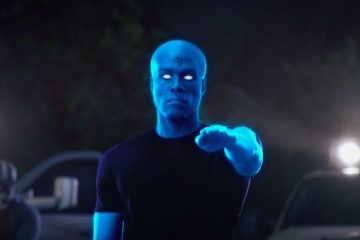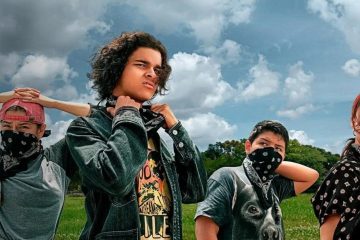As I sit here on June 3 on my lovely porch and hear little more than birdsong, and yet every voyage onto the Internet brings images and sounds of an America on fire with protests over yet more murders of African Americans for the “crime” of simply existing, and of many white people struggling (or, in too many cases, not even trying) to understand the long history of racial oppression that led us here, it’s hard not to be aware of my significant privilege. I’m not especially fond of the clamor to virtue-signal, to post “I love you and am here for you” before scrolling down to a video of someone’s cat doing something totes adorbs and moving on. But what do white (and/or) privileged people like me “do”? This post hardly gives a comprehensive answer, and merely scratches one of many surfaces, but I did want to share a host of documentaries, podcasts, and shows that have told me more, made me realize more and think better about the history and present of oppression of African Americans.
A little background first. I grew up outside the US, only moving here in 2003. That meant that I only knew what pop culture had told me about “the African American experience.” For years, I was keenly aware of my lack of knowledge, feeling I’d missed the history lessons that everyone else had gotten … until I started to realize that few other white Americans seemed to have gotten them either. I regularly found myself in discussions with Americans who’d grown up here, who’d received “good” educations, and yet who knew as little as I did, or even less. Could a media diet of The Cosby Show, Fresh Prince of Bel Air, the nightly news, and the occasional small moments on LA Law when Blair Underwood’s character was allowed to comment on race, supplemented by a few literary forays (mostly from Ralph Ellison, Toni Morrison, and Alice Walker), have seriously given me as much or more information about slavery, segregation, the civil rights era, Jim Crow, redlining, etc. as an entire educational system and life in the US did to many others? Apparently and disgracefully, yes.
My six years on the Board of Jurors of the George Foster Peabody Awards have exposed me to so much more, though, filling in the big picture and many small pictures. I am by no means “enlightened” or “woke” – I still don’t know a lot. But I think back to a neat talk that Michael Kackman gave about witnessing, and about how we need to change the focus from simply speaking and “sharing our truths” to listening, to bearing witness to others’ truths, histories, and experiences. Amidst America’s professed love affair with the First Amendment, too much emphasis has been placed on everyone’s ability to contribute to the public sphere, and on everyone’s right to speak, with not enough corresponding attention to our duty to listen, to witness. And thus I thought it might be worth sharing a list of some of the excellent things that have helped me. I realize the irony that I’m arguing for us to listen by speaking, but it’s not my voice I want you to hear – it’s the spectacular voices of some truly brilliant podcasts, documentaries, radio shows, and television shows about African American lives and experiences. I feel for people of color who are constantly asked by their variously well-meaning or perfunctory friends and colleagues to “tell us what we need to know,” but that’s a lot of labor they’re asked to do. All of the below represent labor already done, so now the labor is upon white audiences and other people of privilege to listen. (And I don’t mean to suggest we need to listen only to African American experiences – there are many other stories we haven’t heard, from Native Americans, from Latino/a Americans, from Asian Americans, and more, but my focus here is on media about Black lives).
(Peabody judges television news too, but I haven’t included any here, given how hard many are to access)
Documentaries
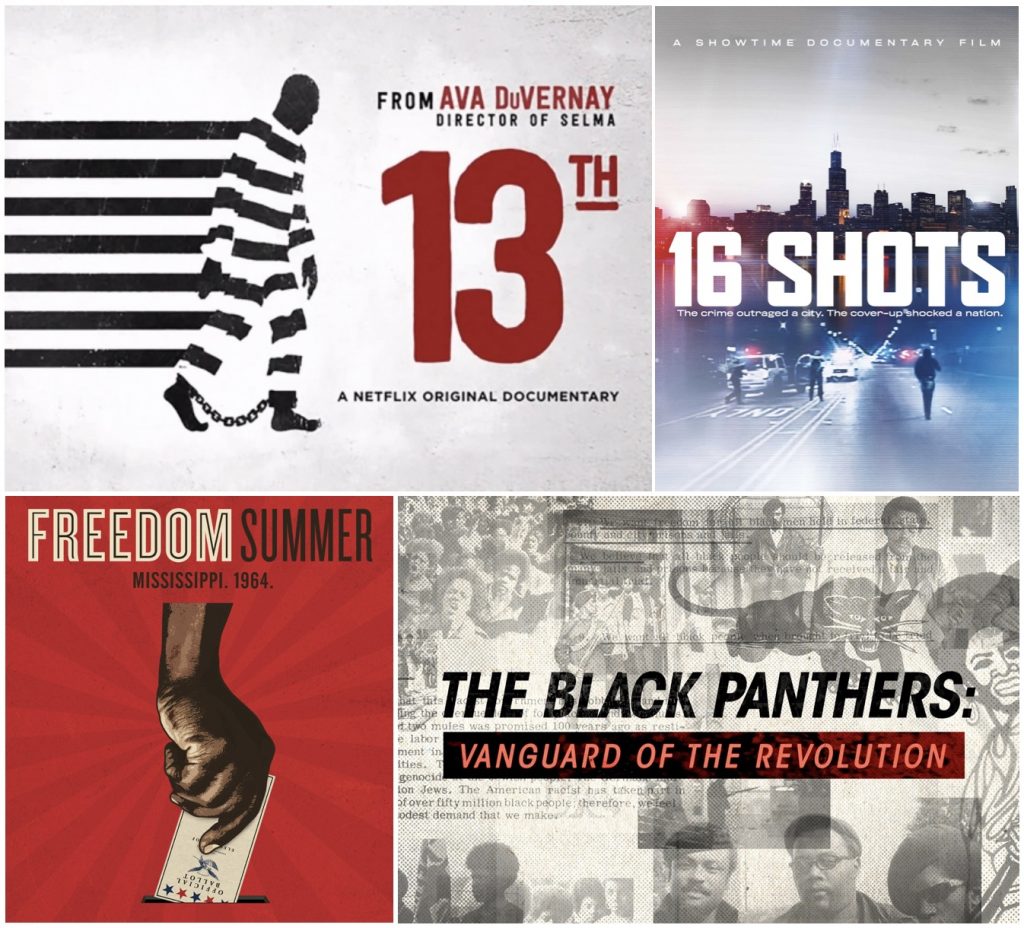
13th – Ava Duvernay’s powerful examination of the 13th Amendment and its legalized continuation of slavery.
16 Shots – Comprehensive and expansive account of the 2014 murder of Laquan McDonald by Chicago police.
The Black Panthers: Vanguard of the Revolution – Stanley Nelson’s deep dive into the rise of the Black Panther Party in the 1960s.
Freedom Summer – Another superb historical doc by Stanley Nelson, this time about the Mississippi Summer Project, a campaign to register African American voters.
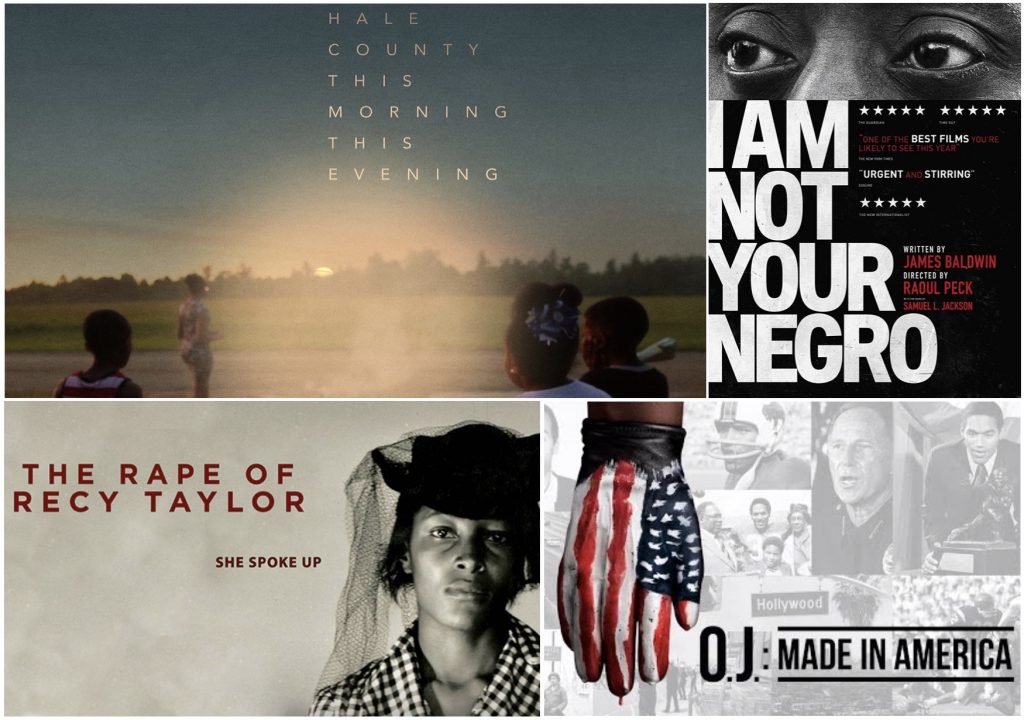
Hale County This Morning, This Evening – A stunningly beautiful film by RaMell Ross about rural Black life in Alabama.
I Am Not Your Negro – I can’t sing this one’s praises loudly enough, Raoul Peck’s poignant and profound rendering of words by and examination of the life and work of James Baldwin.
OJ: Made in America – One of the best docs I’ve seen, Ezra Edelman gives so much context to the OJ Simpson story everyone thinks they know.
The Rape of Recy Taylor – Retells the story of an African American woman raped by six white men in Alabama in 1944, then revictimized when she speaks out. Ends up being as much about a legacy of abuse of Black women.
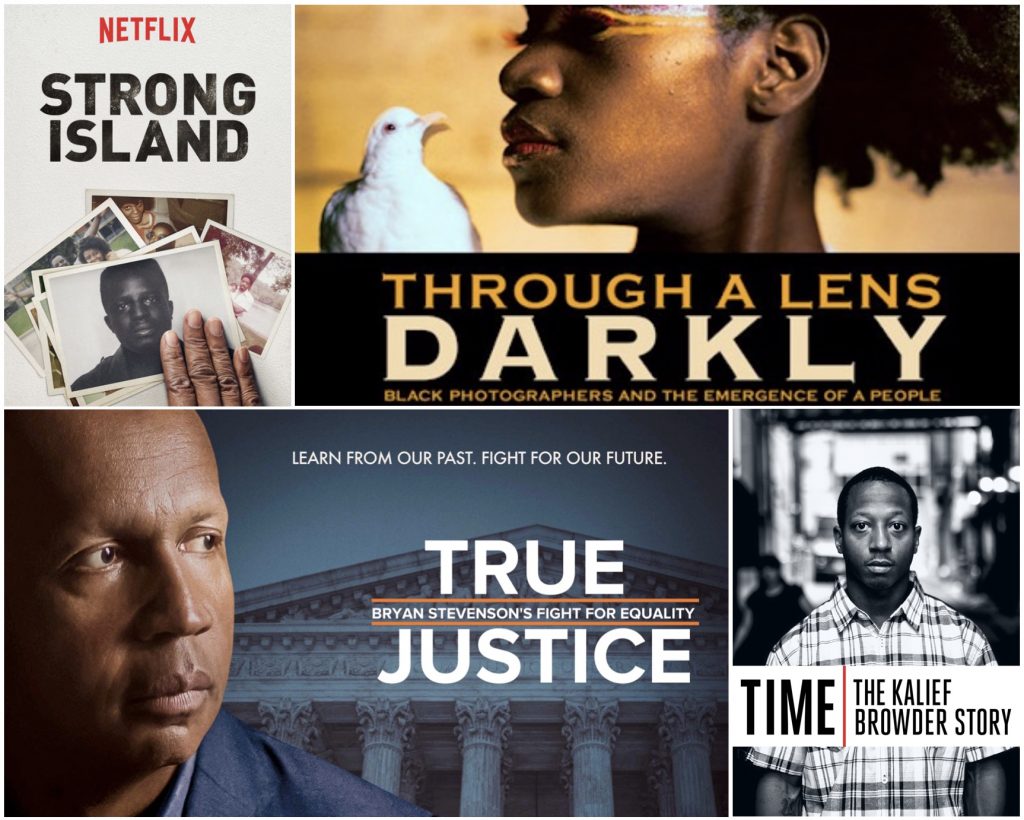
Strong Island – Yance Ford examines the 1992 murder of his brother and an all-white jury’s refusal to indict his white killer.
Through a Lens Darkly: Black Photographers and the Emergence of a People – Excellent to teach with, Thomas Allen Harris explores how photography shaped the identity of African Americans through the medium’s history, and examines Black photographers’ work to reclaim the camera.
Time: The Kalief Brower Story – 6 parter about Browder, a Bronx high school student thrown in solitary confinement for two years without a conviction.
True Justice: Bryan Stevenson’s Fight for Equality – Stevenson shines in this doc that largely just gives him the mic, a wise choice, to discuss his work on criminal justice reform.
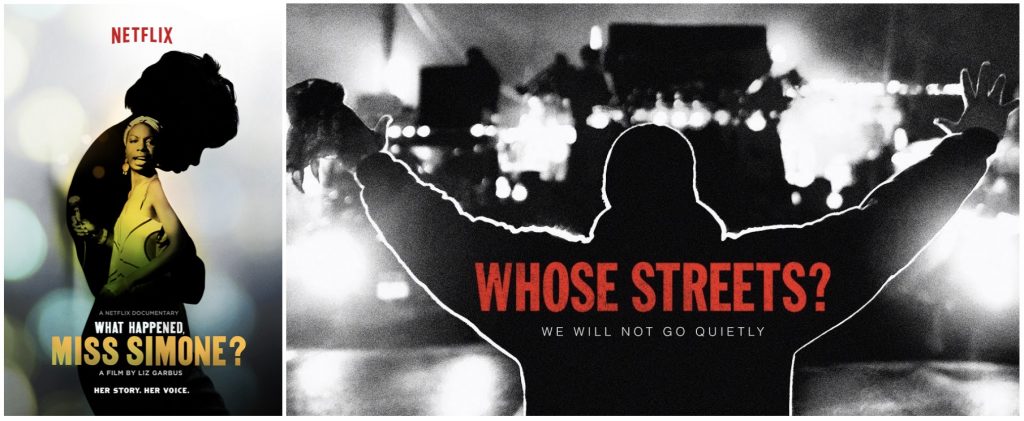
What Happened, Miss Simone? – Bio of famed singer Nina Simone, and of her civil rights activism.
Whose Streets? – Sabaah Folayan’s exploration of the killing of Michael Brown and of the Ferguson uprising.
Podcasts & Radio
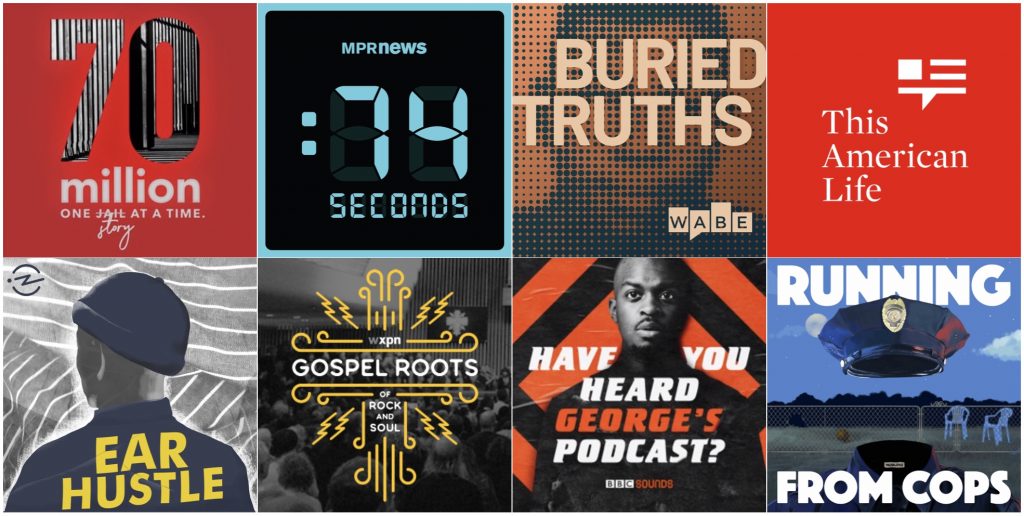
70 Million – The title references/tallies the population of the US with a criminal record, and with such a disproportionate number of prisoners being Black men, Mitzi Miller et al’s exploration of the criminal justice system regularly turns to Black lives and experiences.
74 Seconds – Minnesota Public Radio follows the trial of Jeronimo Yanez for the murder of Philando Castile.
Buried Truths – Excellent historical podcast that is rich with relevance to current events, with s.1 exploring voter intimidation of African Americans (I haven’t heard s.2 yet).
The Case for School Desegregation Today – Nikole Hannah-Jones’ piece for This American Life twins well with The View from Room 205, and focuses on, well, the title says it.
Ear Hustle – Too much media thrives on rendering prisoners as evil folk devils, so this podcast from inmates at San Quentin offers a powerful counterpoint, with often soulful human stories. Not “just” about African American prisoners, but rarely far from Black stories.
Gospel Roots of Rock and Soul – Cece Winans’ documentary of the deep roots of rock and soul in the African American gospel tradition.
Have U Heard George’s Podcast? – Cheating, this isn’t by an African American. George the Poet is British, but his podcast about Black experiences globally is as smart as it is poetic.
Headlong: Running from COPS – Cat-nip for media scholars, a deep dive into COPS, the reality show, and into its mythologization of policing and heightened spectularization of African American criminals.
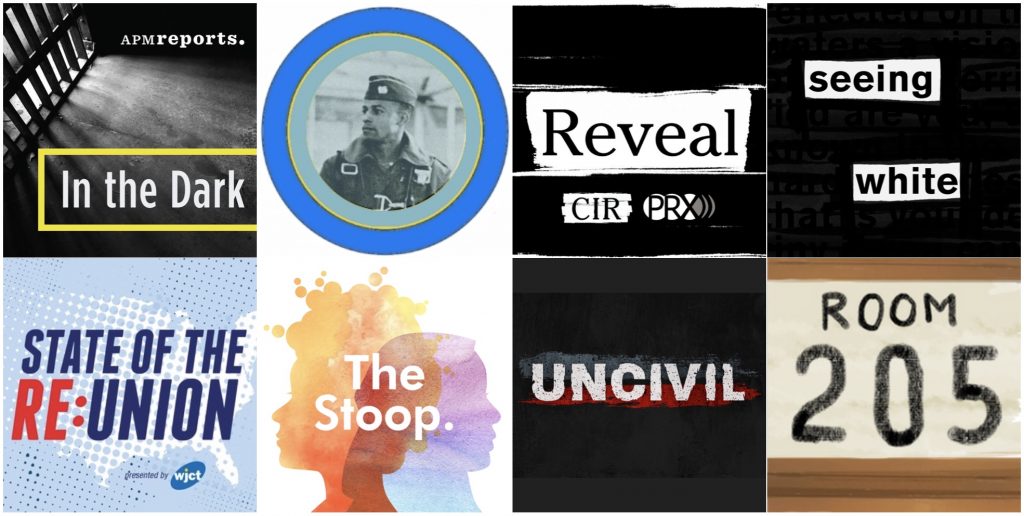
In the Dark, s.2 – Brilliant investigation into the case of Curtis Flowers, tried six times for the same murders in Mississippi, each time with racist jury selection. (n.b: Season 1 is amazing too, but not at all about African Americans, so be sure you go to season 2).
The Memory Palace – Each (brief) episode explores and considers pockets of history. Many are not about African Americans, but I’d highly recommend these two.
Monumental Lies – An excellent discussion of the continuing sore that is Confederate statues … while also examining other monuments to racists.
Seeing White – Scene on Radio’s exploration of whiteness, with regular guest and media studies scholar Chenjerai Kumanyika and other excellent scholars providing needed depth.
State of the Re:Union – Host Al Letson engages a wide range of under-discussed, less-heard-from communities across the US, but has numerous standout episodes on African American communities.
The Stoop – Hosts Leila Day and Hana Baba cover all sorts of issues under the broader umbrella of what it means to be Black and how Blackness is talked about.
Uncivil – Chenjerai Kumanyika appears again in this brilliant podcast about the civil war that centers African Americans and their untold stories.
The View from Room 205 – Amidst the optimism that changing the schools will change everything, this program goes to William Penn Elementary School in Chicago’s West Side to consider the realities for poor kids of color.
Television Entertainment
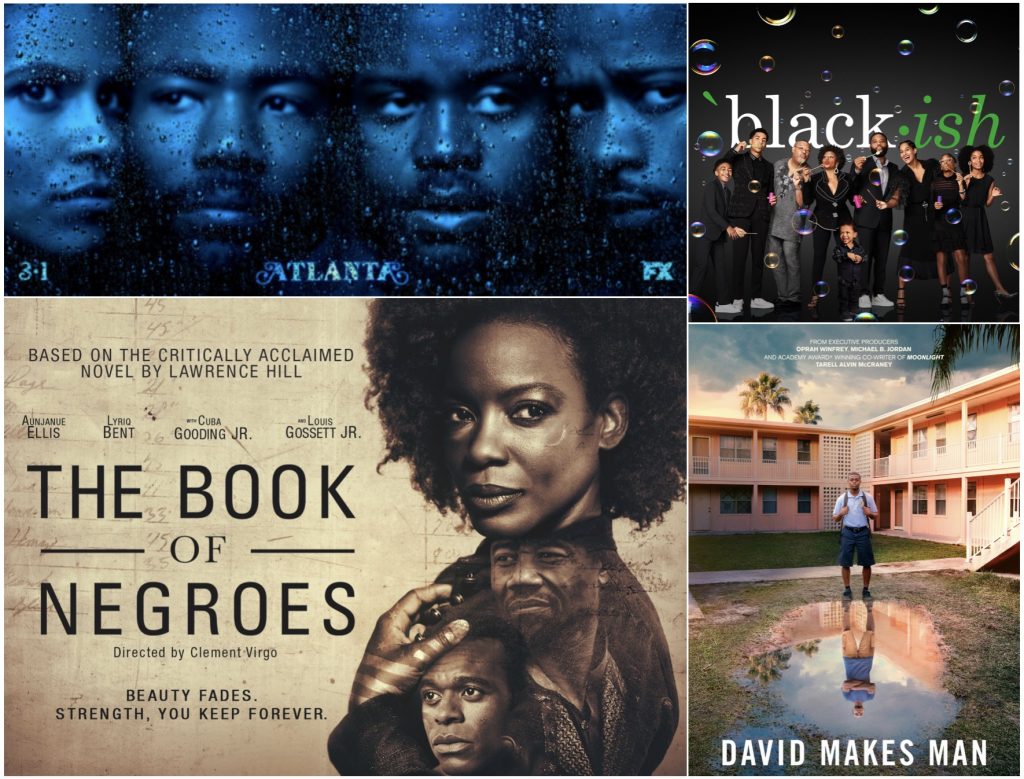
Atlanta (FX) – Following the lives of three friends in Atlanta, one of whom is making it in the rap world, Atlanta offers all sorts of smart commentary on what it means to be African American today.
Book of Negroes (CBC/BET) adapts Lawrence Hill’s novel about the resettlement of Black Loyalists to Nova Scotia during the Revolutionary War.
black-ish (ABC) can roll along doing its average family sitcom things, but has done an especially good job of hitting its mark during special episodes, where it spends its capital earned doing mundane things to offer more trenchant commentary.
David Makes Man (OWN) flew under many people’s radars, but is a superb coming-of-age story about a Black teen in Florida. I particularly valued its focus on code-switching, as David needs to shift gears between the demands of his fancy magnate school and those of his neighborhood.
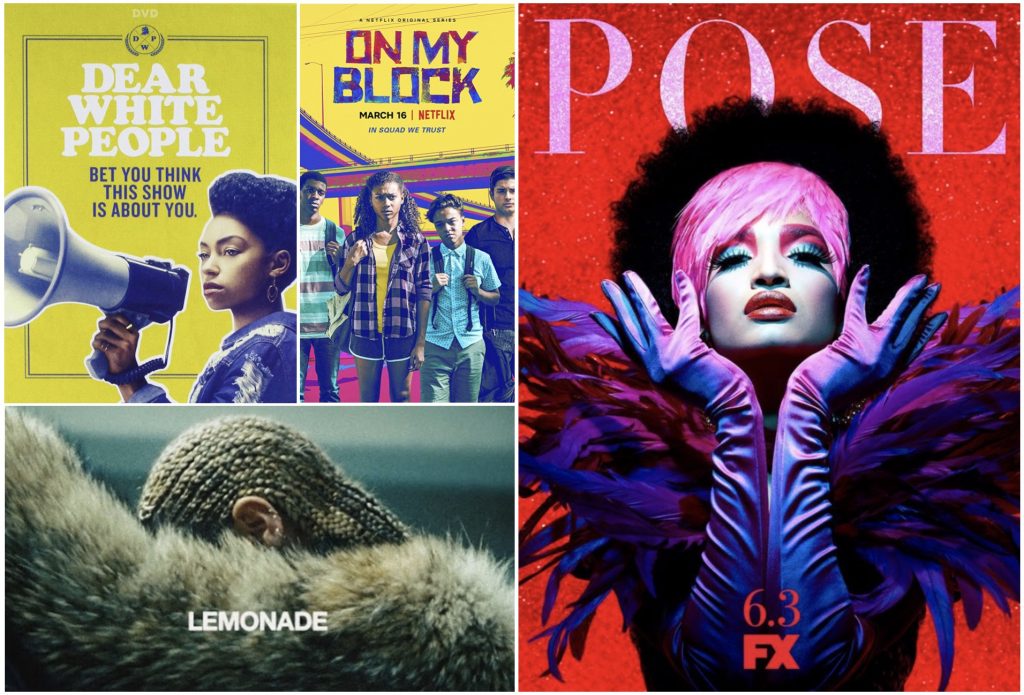
Dear White People (Netflix) is not a favorite of mine, partly because I think it’s about 95% commentary and only 5% character development. But for the purposes of this list, that 95% is therefore important.
Lemonade (HBO) is a remarkable leveling up of the music video by Beyoncé, evocative, thoughtful, powerful.
On My Block (Netflix) risks veering into pretty stereotypical roles and situations, but redeems itself by being one of the very few shows in American TV history that focuses on teens of color, considering their lives and realities.
Pose (FX) follows trans and gay people of color in 80s New York. It’s especially valuable for its intersectional approach to Blackness, and equal parts moving and uplifting, with Billy Porter shining.
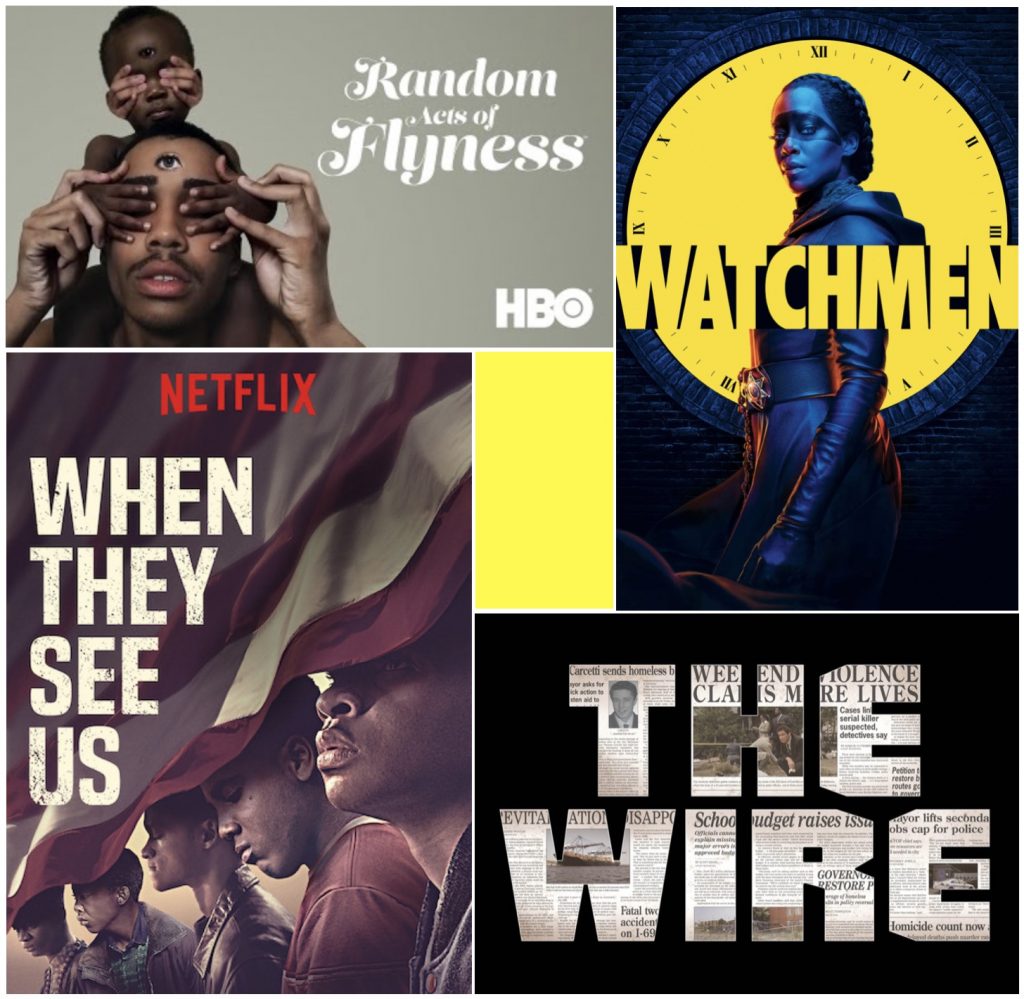
Random Acts of Flyness (HBO) is sort of a sketch comedy show, sort of commentary, a fantastic genre hybrid. To many white viewers it may feel odd and confusing, but that’s a productive feeling, since it helped me realize how much the cultural norms of most television are entirely white, and I appreciated the experience of stepping outside that.
Watchmen (HBO) is set in another world, with superheroes, giant squids, and stately manors on other planets … but its tale of policing, racism, and heroism is very much of our world.
When They See Us (Netflix) is brutal, but that’s the point. Following the case of the Central Park Five and their wrongful conviction and persecution, it makes the damage of the criminal justice system’s racism so very clear.
The Wire (HBO) is the only show on this list that preceded my time on Peabody, but it needs inclusion. I found it personally very helpful for its lessons about context, and about structure; indeed, it may be one of the only shows in American television structure to truly study structure, and hence to give us a view of racism as structural.

